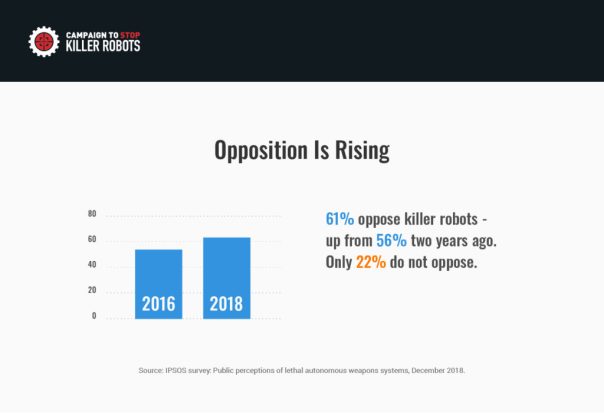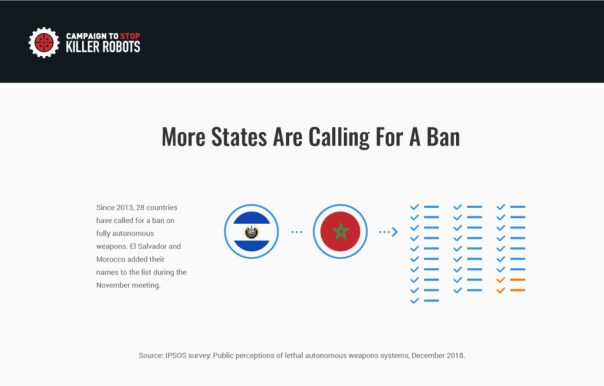
- In the 26 countries surveyed in 2018, more than three in every five people (61%) responding to a new poll oppose the development of weapons systems that would select and attack targets without human intervention.
- Two-thirds (66%) of those opposed to lethal autonomous weapons systems were most concerned that they would “cross a moral line because machines should not be allowed to kill.”
- More than half (54%) of those opposed said that they were concerned that the weapons would be “unaccountable.”
- A near-identical survey in 23 countries by the same company in January 2017 found that 56% of respondents were opposed to lethal autonomous weapons systems, opposition has grown to 61% as of December 2018.
- A majority opposed killer robots in Canada (60%); China (60%); Russia (59%); the UK (54%); and the US (52%).
The results of this poll show that public sentiment is against the development of killer robots. A minority of states at the 2018 November meeting of the annual Convention on Conventional Weapons at the UN in Geneva, used consensus rules to thwart meaningful diplomatic progress. Russia, Israel, South Korea, and the United States indicated at the meeting that they would not support negotiations for a new treaty. Currently, 28 states are seeking to ban fully autonomous weapons. Austria, Brazil, and Chile have formally proposed the urgent negotiation of “a legally-binding instrument to ensure meaningful human control over the critical functions” of weapons systems.

Mary Wareham of Human Rights Watch, Coordinator of the Campaign to Stop Killer Robots, said:
“The window to prevent the development of fully autonomous weapons is closing fast. This poll shows that public opposition is rising and with it the expectation that governments will act decisively and with urgency to deal with this concern.”
“The results of this poll show that public views in nations often identified as most in favour of killer robots, such as the US and Russia oppose the development of these weapons.
“Efforts to address concerns over killer robots via the Convention on Conventional Weapons have failed to move to negotiate new law due to the objections of a handful of states.”
Six out of ten Canadians respondents to the poll opposed the development of weapons systems that would select and attack targets without human intervention commonly known as autonomous weapons systems or killer robots. Canadian opposition to autonomous weapons was on par with the global results but support for such weapons was below the global average with only 15 percent of Canadian respondents supporting the use of autonomous weapons while 25 percent were not sure.

“Canada has a history of leadership on peace and disarmament coupled with a strong AI sector who has been quite outspoken on this issue. A national ban on autonomous weapons systems and leadership internationally are in line with both a feminist foreign policy and the emphasis the government has put on AI as a future driver of the Canadian economy,” said Erin Hunt, Program Manager at Mines Action Canada, a co-founder of the Campaign to Stop Killer Robots.
“The Government of Canada should take note and listen to the voice of their people. Our shared security and humanity hinges on retaining meaningful human control over the use of force. Now is the time for political leadership to begin negotiations of a new treaty to prohibit fully autonomous weapons systems.”
The survey by the market research company Ipsos was commissioned by the Campaign to Stop Killer Robots and conducted in December 2018. Sample size 500 – 1,000 people in each country.
